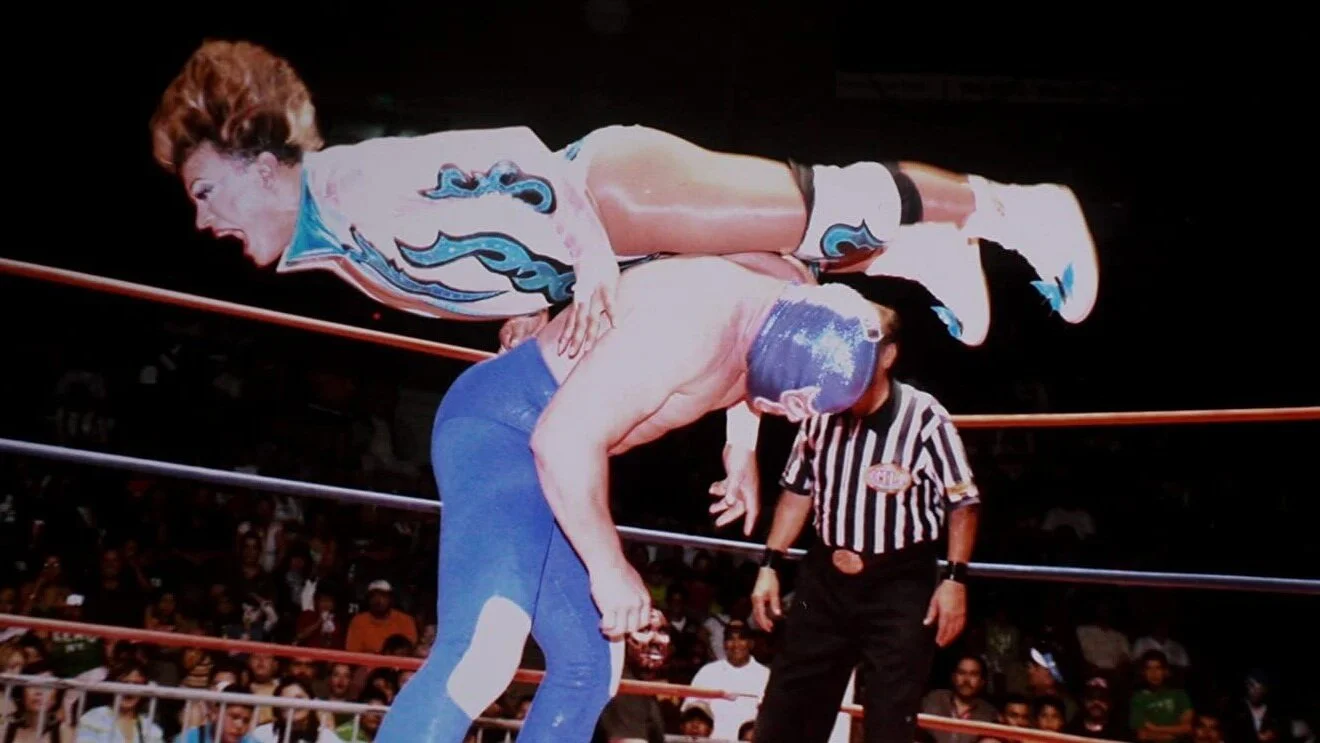Cassandro, The Exotico!
The brave story of a gay wrestling champion emerges at less than full force.
On watching this film one feels that Marie Losier who directed and photographed it in addition to sharing a writing credit has achieved what she set out to do. Even so, a question immediately arises: has she aimed high enough? Her subject in this documentary is Saúl Armendáriz a noted exponent of Lucha Libre wrestling as the professional game is known in Mexico. Although born in Texas, Armendáriz is of Mexican stock and in 1992 he won the Universal Wrestling Association's World Lightweight Championship. However, it was not his sporting record that drew the French filmmaker to him so much as the fact that, despite being involved in a notably macho sport, Armendáriz made a bold decision early on in his career. He chose to take on the ring name of Cassandro and to assert his gay sexuality by donning drag when wrestling. Those who did this were known as 'exóticos' and were, as he tells us, regarded then as the clowns of the circus. The fact that the sport now embraces diversity owes much to Cassandro's exceptional skills which earned him the respect of the other wrestlers and many admirers too. Everything he did was uncompromising.
There is in this a tale of determination and triumph, albeit one that had climaxed before Losier began her five-year stint of filming. Footage of those past events does not appear here with Losier relying instead on Cassandro's reminiscences either made to camera or heard accompanying general footage shot by her. Consequently, his history is only lightly sketched in, a mere outline, since the film's approach is not investigative. Cassandro chooses to be forthright about being bullied as a child and is admirably honest about the need he had for the therapy that enabled him to overcome problems with drugs and alcohol. He also makes clear his love for his parents, his dead mother and a father once troubled by his son's sexuality but now close and supportive. But, while it is apparent that religion is important to him, no questions are asked that would clarify the nature of his beliefs in any detail and nothing is raised regarding any conflicts in that connection due to his proud acceptance of being gay. Similarly, save for the parental background the focus is entirely on his professional life.
The other key aspect present in this movie relates to a drama yet to crystalize fully: given the fact that Cassandro is now reaching fifty he recognises that he should retire but admits that his ego prevents this. Losier's film shot on 16mm, and deliberately as intimate and unpolished as a home movie displays immense empathy with her subject but the filmmaker herself is heard offering him dubious reassurance on this particular issue. Nevertheless, we can see for ourselves that this is not simply something that Cassandro can dismiss as just another bump in the road and that he has built up for himself a life-style that has made little allowance for his needs once retirement becomes inevitable. Since Losier tends to sidestep here she ends up with a film that is increasingly bitty and uncertain in its last scenes and elsewhere, despite some effective montage sequences, she unwisely adopts touches of stylisation including fight scenes shot at 18 frames per second (speeding up does not add to our sense of Cassandro's skills but undercuts them). Ultimately one wants much more than Losier is able or willing to deliver, sympathetic though her film is.
MANSEL STIMPSON
Featuring Cassandro, Hijo Del Santo.
Dir Marie Losier, Pro Antoine Barraud and Carole Chassaing, Screenplay Marie Losier and Antoine Barraud, Ph Marie Losier, Ed Aël Dallier Vega, Art Dir Simon Fravega.
Tamara Films/Tu Vas Voir Productions-MUBI.
73 mins. France. 2018. Rel: 16 May 2020. Available on MUBI. No Cert.


